Doors
Doors, although being the basis for the series and having Markesh and Retrab as leads, is not a prequel. It can best be described as an alternate or simpler version of the same story, or a very similar story with the same characters.
Doors is the short one-shot comic story on which the comic Next Exit is based, having been written a few years earlier by Lijewski for the TokyoPop Rising Star of Manga Contest, where it was a runner-up. The basic premise, as well as the two protagonists, are the same. Retrab and Markesh are seeking a "Door" (a term which in the series is replaced by exit) out of the world of Alkaline, a fantastic dreamscape where thoughts mould and change as rapidly as they can while abiding the rules of this reality. They journey through various traps and monsters (called shadows) to try to reach a door. And eventually they do, but it's not exactly what they expected...
Differences include that Markesh's alchemy is less developed (not in terms of his ability but in explanation), motorized vehicles seem more common place, and Retrab is more useful in a fight, though still careless. Also, Exits are called Doors and neither Maps nor the Academy are mentioned. Doors also are apparently easier to find than exits, but they are individualized, only working for certain people, or even, only a certain person.
It ends up that upon reaching the door, the duo cannot reach it as the door is on the other side of a very deep and wide cliff. Retrab, However, notices a pair of foot prints in the ground facing the door, and encourages Markesh to stand on them. He does and nothing happens, although he does remark that it makes him feel "like an idiot". Retrab shrugs and begins to walk away saying that it must not be their door, but Markesh stops, saying that it might be hers.
Convinced that it won't be, Retrab stands nonchalantly on the foot prints and begins to say how nothing is happening just in time for a bridge of blocks to rise out of the gap and fill the space to the door. She looks on in denial as she realizes that this is her door, but not Markesh's. After some cajoling, Markesh is able to convince her to fearfully leave him behind, promising that he will follow her soon. The comic ends by revealing Retrab, waking in a hospital bed next to several others, the nearest being an unconscious Markesh, and a pull out through another door, revealing the area to be the coma center. Alkaline in this early version of the story is the land where all those forced out of the conscious plane must live. It is yet to be seen if this reality is also true in the series.
Differences Between Doors and Next Exit
Although very similar, the differences between the two stories are noticeable. The art differs the least, the only change being slight alterations to Retrab's visor. The characters are less well-developed in Doors. Retrab seems a bit more useful in a fight in Doors. The alchemy is present in Doors, but lacks any major development.
Doors, being a short story, has an ending. The change from doors to exits could mean that the ways out are more abstract in Next Exit (in Doors, it is implied that every door is in fact a household door.) The term "exit" has not been defined; exits are simply ways of leaving Alkaline.
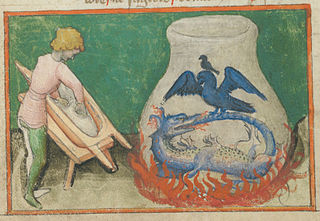
Alchemy is an ancient branch of natural philosophy, a philosophical and protoscientific tradition that was historically practised in China, India, the Muslim world, and Europe. In its Western form, alchemy is first attested in a number of pseudepigraphical texts written in Greco-Roman Egypt during the first few centuries AD. Greek-speaking alchemists often referred to their craft as "the Art" (τέχνη) or "Knowledge" (ἐπιστήμη), and it was often characterised as mystic (μυστική), sacred (ἱɛρά), or divine (θɛíα).
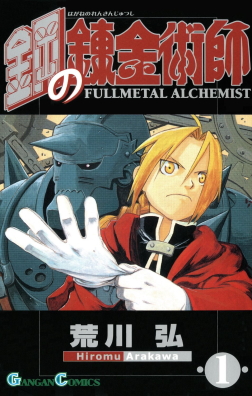
Fullmetal Alchemist is a Japanese manga series written and illustrated by Hiromu Arakawa. It was serialized in Square Enix's shōnen manga anthology magazine Monthly Shōnen Gangan between July 2001 and June 2010; the publisher later collected the individual chapters in 27 tankōbon volumes. The steampunk world of Fullmetal Alchemist is primarily styled after the European Industrial Revolution. Set in a fictional universe in which alchemy is a widely practiced science, the series follows the journey of two alchemist brothers, Edward and Alphonse Elric, who are searching for the philosopher's stone to restore their bodies after a failed attempt to bring their mother back to life using alchemy.

Johann Konrad Dippel, also spelled Johann Conrad Dippel, was a German Pietist theologian, physician, and alchemist.

Fullmetal Alchemist 2: Curse of the Crimson Elixir is the second role-playing video game for the PlayStation 2 based on the series of the same name. It is the prequel of sorts to Fullmetal Alchemist and the Broken Angel. The game has much improved visuals than the previous title, as well as all dialog being voiced over. To help boost sales, Square Enix decided to release the game with a bonus DVD in the United States containing the second and third episodes of season two of the Fullmetal Alchemist anime series, since the show took a four-month break in its Adult Swim broadcast. This DVD contains only English audio, with the shortened version of the second opening theme song "Ready Steady Go" by L'Arc-en-Ciel and the shortened third ending "Motherland" by Crystal Kay.

Fullmetal Alchemist and the Broken Angel is an action role-playing game developed by Racjin and published by Square Enix for the PlayStation 2 console. The game features an original story by Hiromu Arakawa, the creator of the Fullmetal Alchemist manga. It is based on the Fullmetal Alchemist manga series, also published by Square Enix. The game was released in Japan on December 25, 2003, and in North America on January 18, 2005.

Edward Elric is a fictional character and the titular protagonist of the Fullmetal Alchemist manga series created by Hiromu Arakawa. Edward, titled the Fullmetal Alchemist, is the youngest State Alchemist in the history of the fictional country of Amestris. His left leg was divinely severed in a failed attempt to resurrect his dead mother, and then his right arm was taken in exchange for his brother's soul. His missing limbs have been replaced with sophisticated prosthetics called automail. He and his younger brother, Alphonse, who lost his entire body and is spiritually bound to a suit of armor, scour the world in search of the Philosopher's Stone in the hopes of restoring their bodies. Edward has appeared in other media from the series, including video games, original video animations (OVAs) and light novels.
Prosthetics, the artificial replacement of organic limbs or organs, often play a role in fiction, particularly science fiction, as either plot points or to give a character a beyond normal appearance. Numerous works of literature, television, and films feature characters who have prosthetics attached.
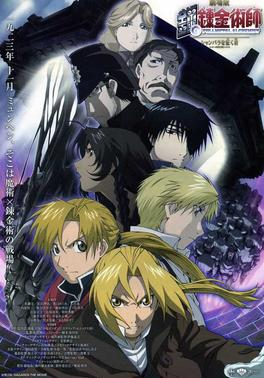
Fullmetal Alchemist the Movie: Conqueror of Shamballa is a 2005 Japanese animated science fantasy action film directed by Seiji Mizushima and written by Sho Aikawa. The film is a direct sequel and conclusion to the first Fullmetal Alchemist television series which loosely adapted from the original manga series of the same name by Hiromu Arakawa and published by Square Enix. Conqueror of Shamballa follows the story of alchemist Edward Elric as he attempts to return to his homeworld, having lived for two years in a parallel universe, while his younger brother Alphonse is also trying to reunite with him by any means necessary. Edward's search attracts the attention of the Thule Society, which seeks to enter his homeworld, believing it to be Shamballa, to obtain new weapons to help them in World War II.

Doctor Alchemy is a name used by three different supervillains appearing in American comic books published by DC Comics. The most notable was Albert Desmond, who originally used the name of Mister Element.
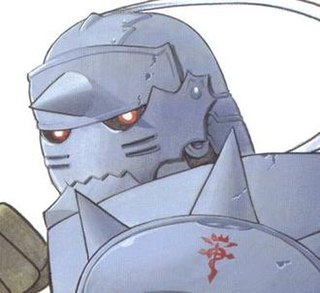
Alphonse Elric is a fictional character and one of the protagonists in the Fullmetal Alchemist manga series and its adaptations created by Hiromu Arakawa. Alphonse is a child who lost his body during an alchemical experiment to bring his deceased mother back to life and had his soul attached to a suit of armor by his older brother Edward. As a result, Alphonse is almost invulnerable as long as the armor's seal is not erased, but is unable to feel anything. To recover their bodies, the Elrics travel around their country Amestris to obtain the Philosopher's Stone—an alchemical object that could restore them. In the animated adaptations of Fullmetal Alchemist, Alphonse is voiced by Rie Kugimiya in Japanese. In the English adaptations, he is voiced by Aaron Dismuke in the first series and by Maxey Whitehead in the second.

Colonel Roy Mustang is a fictional character from the Fullmetal Alchemist manga series and its adaptations created by Hiromu Arakawa. In the series, Mustang is a State Alchemist of Amestris' State Military, as well as the superior of the series' protagonist, Edward Elric. Mustang holds the title of "Flame Alchemist" for his ability to create fire with alchemy, and he ambitiously strives to become the next leader of Amestris. Despite his ambition, as the series continues, Mustang decides to overthrow the State Military after his best friend, Maes Hughes, is killed by the homunculi, who are controlling the Military.
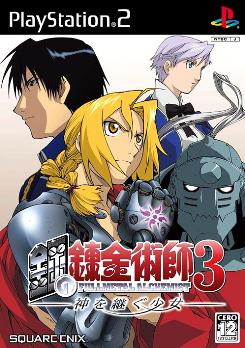
Fullmetal Alchemist 3: Kami o Tsugu Shōjo is the third Fullmetal Alchemist video game for the PlayStation 2 and a role-playing video game continuation of the series of Square Enix games. The first two games in the series are Fullmetal Alchemist and the Broken Angel and Fullmetal Alchemist 2: Curse of the Crimson Elixir.

Winry Rockbell is a fictional character from Hiromu Arakawa's Fullmetal Alchemist manga series and its adaptations. Winry is a teenage mechanic who often spends time with the central characters, brothers Edward and Alphonse Elric, who are childhood friends of hers. Specializing in mechanical repair, specifically prostheses called automail, Winry services Ed's replacement arm and leg. Originally meant to be introduced in the series' first chapters due to its lack of female characters, some of Winry's traits are based on Arakawa's own life. In the first anime adaptation, Fullmetal Alchemist, Winry is voiced by Megumi Toyoguchi in Japanese and by Caitlin Glass in the English version. In the second anime adaptation, Fullmetal Alchemist: Brotherhood, she is voiced by Megumi Takamoto in Japanese, with Glass reprising the role in English.
Christy Lijewski is an American comic book artist and illustrator who specializes in OEL manga.

Scar, also known as Scarred Man, is a fictional character from the Fullmetal Alchemist manga series and its adaptations created by Hiromu Arakawa. Scar is introduced as a villain who targets alchemists working for the state military from the fictional country of Amestris. Scar hails from the region of Ishval whose people were almost exterminated in a previous civil war against the state military, most notably their alchemists. His alias is derived from the prominent X-shaped scar that decorates his brow with his birth name being unknown. As the series continues, Scar's backstory is further explored and he questions his motives, eventually joining the side of the Amestrian State military, assisting in an armed coup against the government in order to defeat the organization secretly responsible for the Ishvalan Civil War.
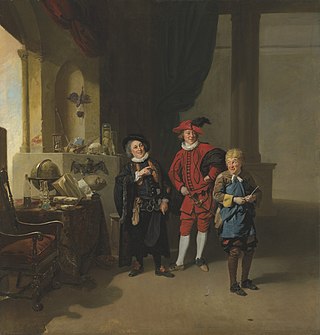
Alchemy has had a long-standing relationship with art, seen both in alchemical texts and in mainstream entertainment. Literary alchemy appears throughout the history of English literature from Shakespeare to modern Fantasy authors. Here, characters or plot structure follow an alchemical magnum opus. In the fourteenth century, Chaucer began a trend of alchemical satire that can still be seen in recent fantasy works like those of Terry Pratchett.
Cul de Sac is an American comic strip created by Richard Thompson. It was distributed by Universal Press Syndicate/Universal Uclick to 150 worldwide newspapers from 2004 to 2012.
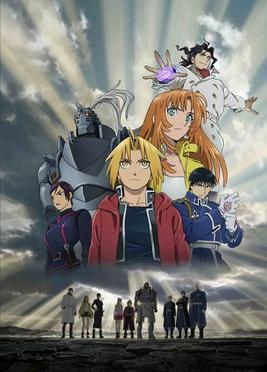
Fullmetal Alchemist: The Sacred Star of Milos is a 2011 Japanese animated fantasy action film based on Hiromu Arakawa's manga series Fullmetal Alchemist. The film was first announced, after the success of the anime television series adaptation Fullmetal Alchemist: Brotherhood. The film premiered on July 2, 2011. Those who attended it received an exclusive manga volume titled Fullmetal Alchemist Volume 11.5 ~Tabidachi no Mae ni~.
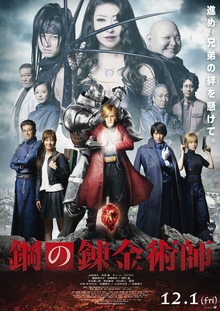
Fullmetal Alchemist is a 2017 Japanese science fantasy action film directed by Fumihiko Sori, starring Ryosuke Yamada, Tsubasa Honda and Dean Fujioka and based on the manga series of the same name by Hiromu Arakawa, covering the first four volumes of the original storyline. It was released in Japan by Warner Bros. Pictures on 1 December 2017. The theme song of the film, "Kimi no Soba ni Iru yo", is performed by Misia. Two sequels were released in 2022: Fullmetal Alchemist: The Revenge of Scar and Fullmetal Alchemist: The Final Alchemy.














